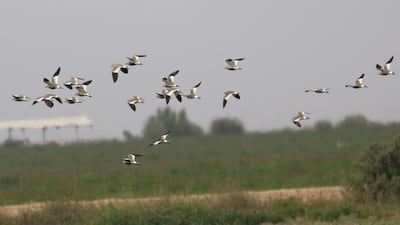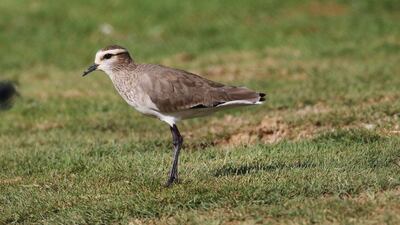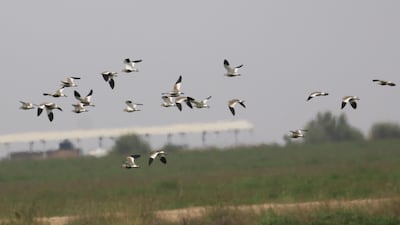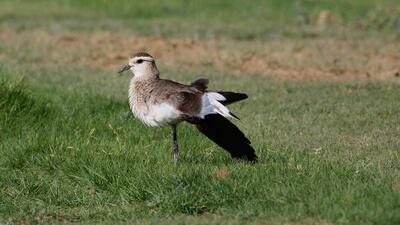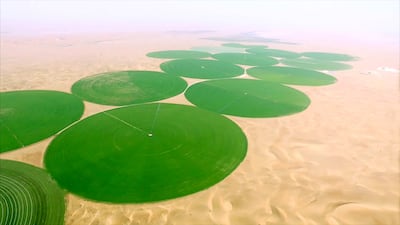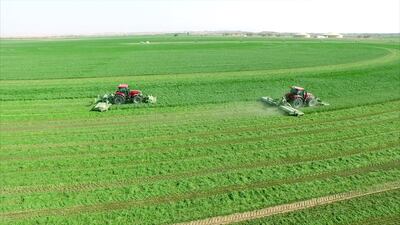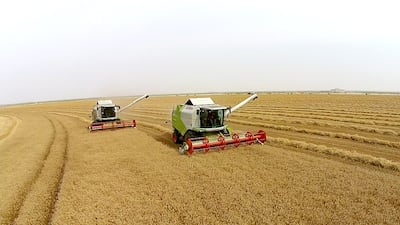The sighting of record numbers of a critically endangered bird in Abu Dhabi this winter has excited conservationists.
At least 34 sociable lapwings – scientific name Vanellus gregarius – were recorded at Al Maha Pivot Fields on February 16. This is almost three times the previous record, when 12 were sighted.
Numbers have declined more than 90 per cent since the 1930s, with just 24,000 left in the world.
While they are usually recorded in the UAE in very small numbers every year, to have such a large number here is striking.
It is believed the birds, which feed on insects and other small prey in grassland, spend time in the UAE before continuing their migration. But this record number raises hopes it could mark the start of a regular winter presence.
"The record is of great national and international significance," said Oscar Campbell, a local birdwatcher, who visited the site on February 19 after he heard of the discovery from a colleague.
"It is a significant chunk of the world's population in one small area," said Mr Campbell, who recorded 23 of the birds there.
Sociable lapwings – which get their name because they nest in groups and migrate in large flocks – breed on the northern Kazakhstan steppe and migrate south to warmer climes in India and Pakistan and south-west to Africa for the winter. Their presence in the UAE could indicate a shorter and safer migration.
Mr Campbell, who also jointly spotted another extremely rare bird at Abu Dhabi's Saadiyat Beach Golf Course last year, said this recent discovery is hugely important.
“They are a great bird to see and it was exciting – if thought-provoking – to know you are looking at something so rare,” said Mr Campbell.
The sociable lapwing is about 30 centimetres in length and beige-coloured with a black cap and eye-stripe.
Numbers declined started from the 1950s when the steppe was ploughed in the Soviet era to grow cereals.
The species is now listed as critically endangered by the International Union for Conservation of Nature, chiefly because of illegal hunting on the migratory paths. Loss of habitat is another factor in its decline.

“This sighting is very significant in the context of the UAE,” said Rob Sheldon, chairman of the Ornithological Society of the Middle East, the Caucasus and Central Asia, and an expert on the sociable lapwing.
“It provides us with a lot of information and it is part of cycle we know least without. We are pretty sure they are wintering here but more study is needed.”
Only one sociable lapwing was left in March and it is now believed all have moved on as summer approaches.
So rare and endangered is the bird that Abu Dhabi's Mohamed bin Zayed Species Conservation Fund has donated grants – including to Mr Sheldon – to assist with its conservation.
The record is now listed in the UAE bird database.
The sighting also highlights how modern irrigated farms can provide new habitats.
Al Maha Pivot Fields is a private farming complex in the Abu Dhabi desert close to the border with Dubai. The pivot refers to the circular irrigation system, while there is also a natural lake there fed by groundwater.
According to Mr Sheldon, more birds have been attracted to the Middle East in recent years because of the growth in such farms.
"It is an interesting development," he said.
“More birds are being seen, perhaps because more people are looking but also because new habitats are being created giving them shelter and food.”
The site is run by Abu Dhabi’s Elite Agro, which produces and supplies fruit and vegetables across the region.
“For me it is something I am proud of,” said Abdulmonem Al Marzooqi, the deputy chief executive of the company, of the record sighting.
“We protect the area. We observe, we monitor them and do not disturb them. We take care of them,” he said.
“There is grass, bushes and different types of plants growing there. No cars or trucks can cross that area. It is part of our vision.”
